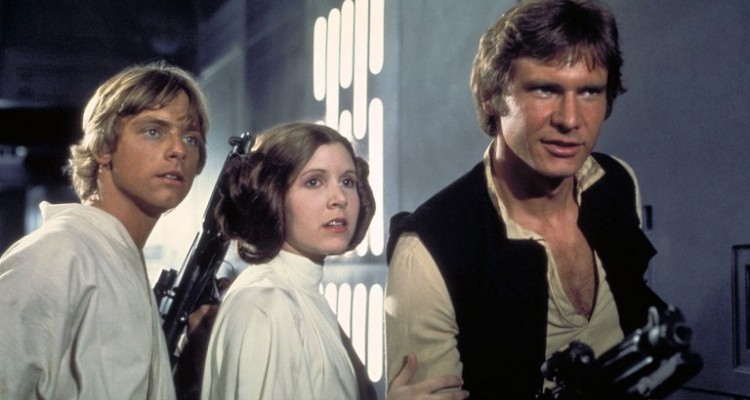Don’t blame George Lucas for what accidentally came after the 1977 film.
The argument over whether Star Wars saved or doomed Hollywood by the scale of its success, and by the industry it created in its wake, is one that’s gone on since the movie’s original release almost 40 years ago. The real answer is “both” — it would be short-sighted at best to deny more lessons have been learned from the merchandise opportunities Star Wars created than its world-building — but just because George Lucas’s galaxy far, far away created an Empire of its own doesn’t mean that it’s worthless as a movie.
Despite that, The Hollywood Reporter executive editor, features, Stephen Galloway recently suggested that Star Wars is less than the sum of its parts, and is far more successful as a corporate property than series of stories. “There’s a strange thing I’ve noticed,” he wrote in a column titled “Why I Hate ‘Star Wars,'” published Monday. “No one ever seems to defend Star Wars (or any other franchise) as a great work of art.”
That’s untrue, of course; there are countless books, essays and internet arguments on the artistic worth of any and every facet of Star Wars from George Lucas’ original movie through to the now non-canonical Expanded Universe merchandise from cultural critics, academics and fans alike. It’s nonetheless true, however, that Star Wars-as-franchise often overshadows Star Wars-as-artistic-endeavor, and that’s a shame.
It’s unmistakably true that, as Galloway wrote, Star Wars borrows — if not outright steals — from a number of places: 2001: A Space Odyssey, Metropolis and The Hidden Fortress, as Galloway suggested, but also the comic books and pulps of Lucas’ upbringing and their antecedents. (The crossover between Jack Kirby’s comics and Star Wars is often commented upon.) But the result of this combination was something that touched a nerve in a way that the individual elements had never managed on their own, with the result being a significant shift in the medium going forward.
In that, Star Wars follows in the footsteps of the musical career of The Beatles and the 1960s creation of Marvel Comics — both significant milestones in popular culture that dramatically changed their chosen fields in ways in which those involved couldn’t have imagined, especially considering that both The Beatles and the Marvel creator brain trust got started essentially trying to recreate work they admired by other artists. Three of the biggest pop cultural events of the last 60 years — if not the three biggest — have come, essentially, from trying to copy something someone else did and getting it wrong in such a way that it’s more appealing to people than the originals; there’s something charming, and frustrating, about that in equal amounts.
(Undoubtedly, those it frustrates the most are those who want to innovate instead of refine; Galloway isn’t wrong in complaining that “franchise product isn’t meant to be original”; very little successful pop culture is; en masse, audiences prefer something that’s survived past the prototype stage.)
The power of crowds might seem like a weak identifier of artistic worth — everyone can point to a massively successful project which, to them, is creatively bankrupt, let’s be honest — but it’s a useful tool in this case; surely the fact that Star Wars was quite as successful as it was (as it continues to be; look at last year’s Star Wars: The Force Awakens) proves that Lucas was adding something of his own to the mix of influences, even if it was simply his taste in choosing what elements to combine. (Everything is a remix, after all.)
Does that mean that Star Wars is proven to be a “great work of art”? Doubtlessly not — the actual movie (and greater franchise) will convince you of that more than any conversation about its creation, if all goes well. But putting it in the context of The Beatles and Marvel Comics might allow the franchise to be separated from everything that followed. Does anyone really blame The Beatles for the music business that existed after 1970? (E.L.O., sure, but that’s all Jeff Lynne’s fault, really.) Can the omnipresence of superhero crossover comics be placed at the feet of what Lee and Kirby did in their Fantastic Four run?
The art should be separated from the effect, in order to be judged — and, in deciding whether something is or isn’t a great work of art, it’s also valuable to look outside individual taste. 50,000,000 Elvis Fans Can’t Be Wrong, as the saying goes, and there are at least as many people out there who’d argue that George Lucas hit on something when it came to Star Wars a long, long time ago. If nothing else, given all that Galloway complains about that changed in the aftermath of the original movie’s success — which is to say, a mass change in focus for the western movie industry — it should be considered one of the most important pieces of art in the last half-century.


Leave a Reply